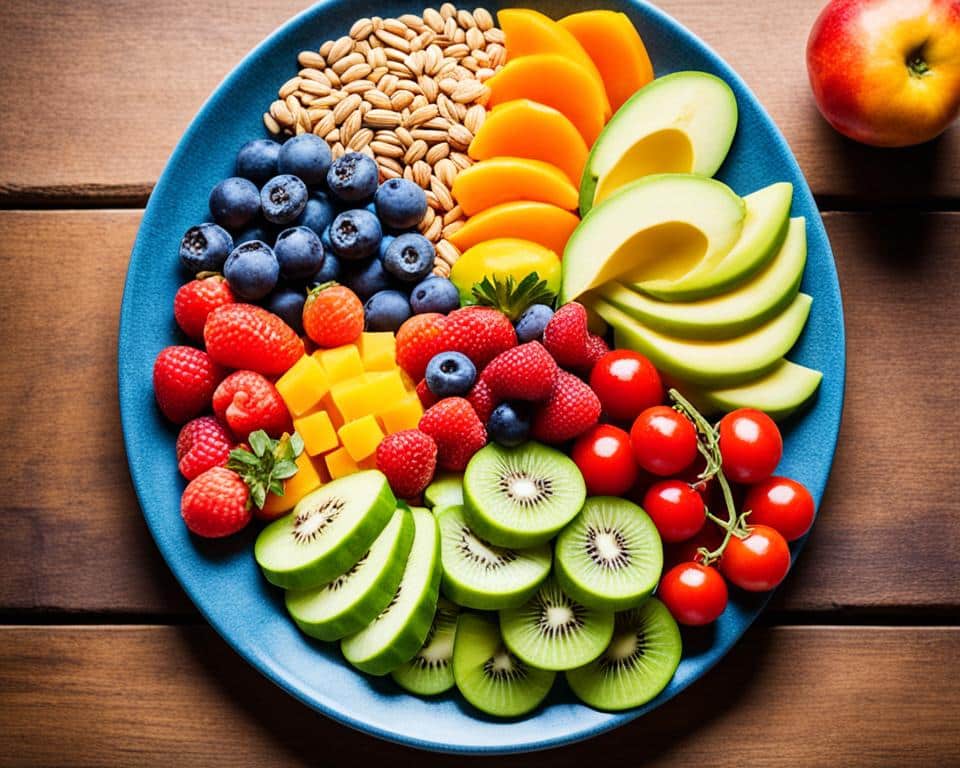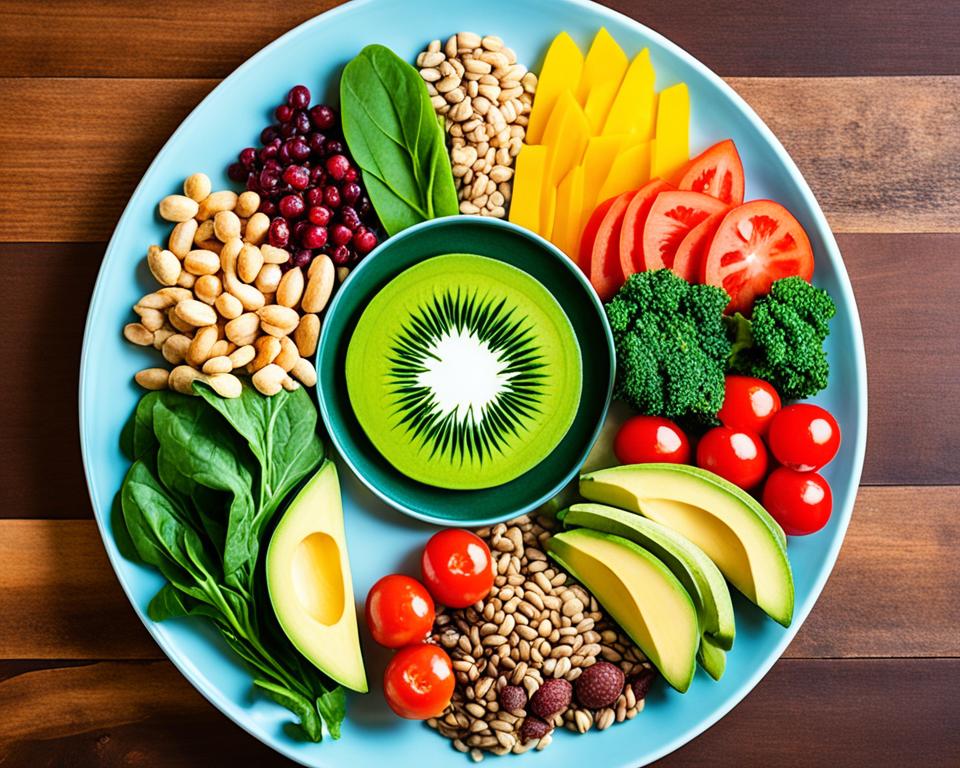
Embracing a Low Sugar Diet for Healthier Living
I know how powerful a Low Sugar Diet can be because I’m a natural bodybuilder and personal trainer. Cutting back on sweets isn’t the only thing you need to do; a whole-foods shift toward healthy eating can have huge effects on your mind and body. Cutting back on sugar is a game-changer for everything from losing weight to managing diabetes.
When I say “change,” I mean the kind of change that makes you lose weight for good, not just for a short time. When you eat foods that are low in sugar, your blood sugar stays steady. This keeps you from getting those quick highs and crashes. And let’s be honest: you can’t put a price on the peace of mind you get from eating well.
So here’s the deal: cutting down on sugar isn’t just about looking good – it’s about feeling good. The benefits of a low-sugar diet can’t be denied, no matter how fit you are or how new you are to it. You’ll be healthier and more energetic if you swap out foods that are high in sugar for foods that are high in nutrients. I’m sure your body will appreciate it.
Key Takeaways
- Adopting a Low Sugar Diet aligns with both weight loss and diabetes management.
- Reducing sugar intake ensures stable blood sugar levels and high energy throughout the day.
- Emphasizing healthy eating habits can lead to improved mental clarity and mood stability.
- A natural bodybuilder’s approach incorporates whole, nutrient-rich foods that minimize sugar consumption.
- Personal trainer insights highlight the importance of consistency and balanced nutrition for long-term health benefits.
The Sweet Escape: Understanding the Impact of Sugar on Health
As we navigate the sugary waters of modern diets, it becomes clear that a Low Sugar Diet isn’t just a fad; it’s a path to sustained health. Tackling the sugar issue head-on, we see its tendrils extend into multiple aspects of wellness, from physical to mental health. In this section, we’ll unravel the complexities of sugar’s impact on our body and psyche.
The Connection Between Sugar and Chronic Health Issues
Some unsettling facts about the average American diet show a clear link between eating a lot of sugar and long-term health problems. It is becoming alarmingly clear that eating foods high in sugar makes you more likely to get health problems like heart disease and type 2 diabetes.
Finding low-glycemic foods that can help keep our blood sugar levels from rising too quickly is more than just a precaution; it’s a way to improve our health.
Navigating the Hidden Sugars in Processed Foods
It happens all the time: we pick up a packaged item off the shelf because the front label says it’s “healthy,” only to find that the list of ingredients is full of sugars we didn’t know about. These sneaky sweeteners hide behind different names, ready to ruin our efforts to eat healthily.
Learning about these hidden sugars not only makes our food taste better, but it also protects us from the sugar trap that is always in our pantry.
What Sugar Does to Your Mind: From Cravings to Mood Swings
Sugar does two things to us: it makes us feel bad and it makes our waists bigger. The sugar can make us want it in ways that are similar to being hooked on it, which is why it is a secret agent of chaos. This can make us keep going through ups and downs.
It’s hard on our mental health because it makes it hard to think clearly and feel stable. But these waves can be calmed by making smart changes to our diet. A sugar-free diet slowly frees us from sugar’s sweet grip.
Low Sugar Diet: The Pathway to Enhanced Well-Being
Going on a low-sugar diet helped me understand it’s about more than just losing weight. I changed the way I eat to be healthier, which gives me more energy and fewer cravings. That’s the kind of win we’re talking about here—like getting better at a health game.
Let us break it down. Key is to eat whole foods instead of sugary junk food. My clients and I are in better health, and it’s not just because we’ve lost weight. It’s also because we’re getting more nutrients from real food. The real stars here are whole foods.
When you want something sweet? Stevia and other natural sweeteners are what I’ll use. These helpers keep things in balance without tipping the scales too far toward a blood sugar spike. It’s about making better decisions one meal at a time so that your energy levels stay steady.

Imagine this: your usual sugar-laden snack versus a handful of almonds or a fresh apple. One leads to a crash; the other, to sustained fuel. You know the score. Making these choices stick will revamp the way you feel daily. That’s the power of a low-carb diet at play. By focusing on whole, nutrient-dense foods, you’re giving your body the tools it needs to operate at its best. When comparing different approaches like the paleo diet vs keto diet, it’s clear that tailoring your choices to fit your lifestyle and goals is key. Both can help reduce processed carbs, but understanding their unique principles can help you take control of your energy and overall health.
Benefits of Low Sugar Choices
| Before and After: Low Sugar Choices | Benefits |
|---|---|
| Refined Sugary Snacks | Energy Crash and Weight Gain |
| Whole Foods with Natural Sweeteners | Stable Energy and Weight Management |
| High-Carb Processed Foods | Sugar Addiction and Mood Swings |
| Low-Carb Whole Foods | Improved Nutrient Intake and Balance |
There’s a simple truth I’ve learned in the gym and in life: taking charge of what you eat empowers you in ways you can’t even imagine. A Low Sugar Diet isn’t a temporary fix; it’s the groundwork for a fortified lifestyle where healthy eating is the norm.
- Choose whole fruits over juices—fiber’s your friend.
- Read labels; those hidden sugars can sneak up on you.
- Meal prep with an emphasis on balance. Remember, protein and fat are part of the equation.
It comes down to this: a Low Sugar Diet is a journey. And like any journey, it starts with that first step – or in this case, that first bite. Here’s to making each choice count and each meal a step toward enhanced well-being!
Whole Foods and Low Glycemic Options: A Dual Approach to Reducing Sugar
As a personal trainer and supporter of healthy eating, I can say from personal experience that adding whole foods and low-glycemic foods to my diet has changed my life. This powerful pair is great for people who want to start a Low-Sugar Diet because it gives you long-lasting energy and improves brain function.
It will be easier to keep your blood sugar levels steady if you choose to eat foods that release glucose slowly into the bloodstream. This not only stops those annoying sugar cravings, but it also helps you live a healthy, energized life.

Discovering Nutrient-Rich Alternatives to Sugary Staples
Part of my daily routine is to eschew sugary quick fixes in favor of nutrient-dense replacements that pack a punch. When I’m in need of a sweet fix, I turn to options like berries, nuts, and seeds – all of which are replete with vitamins, fibers, and antioxidants – to satisfy that craving without spiking my blood sugar.
The Synergy of Whole Foods and Low Glycemic Foods in Balancing Blood Sugar
The harmony between whole foods and low glycemic options is undeniable. They work in concert to provide a steady stream of energy, crucial for those intense workout days or when you need to stay sharp for life’s tasks. This approach isn’t about deprivation; it’s about making smart swaps that can elevate your health.
| Food Choices | Glycemic Index | Health Benefits |
|---|---|---|
| White Bread | High | Short-term energy, quick hunger return |
| Whole Grain Bread | Low to Medium | Lasting energy, prolonged satiety |
| Candy Bars | High | Rapid sugar spike, fast energy drop |
| Nuts and Seeds | Low | Rich in nutrients, balance blood sugar |
| Sugary Cereals | High | Quick digestibility, subsequent hunger |
| Oats | Low | Slow digestion, steady energy release |
One thing I drum into my clients – and myself – is the impact of sugar reduction strategies on our overall wellbeing. I’ve watched countless friends and clients experience heightened clarity and a newfound zest for life simply by tweaking their diets to embrace low glycemic foods and whole food options. It’s not just about the numbers on the scale, but the profound vitality felt from the inside out.
- Bid goodbye to empty calories and hello to whole foods for a thriving mind and body.
- Explore and enjoy foods that not only tantalize your taste buds but also treat your body right.
- Embrace a balanced, low sugar approach to eating for holistic health and lifelong vitality.
How to Do Smart Grocery Shopping: Finding and Picking Low-Sugar Items
Especially if you’re on a Low Sugar Diet, walking through the grocery store aisles can feel like getting lost. To find out what hidden sugars are on food labels, I’ve spent hours reading them carefully.
You have to be like a detective in the grocery store and keep an eye out for sugars that are hiding and can ruin your healthy eating plans. If you know what to look for, you can bring home foods that are high in nutrients instead of foods that are misleadingly labeled as “healthy.”
If you know how to do it, shopping for groceries strategically will become second nature. Real, whole foods are what every good low-carb diet is built on, so I’m always on the lookout for them. Labels that say “low-fat” or “fat-free” aren’t always what they seem to be; they often hide extra sugars.
Quality is more important to me than flashy claims, so I choose low-sugar foods that meet my body’s needs. That’s the kind of alertness that helps you live a healthy, long-lasting life.
When you shop, make smart choices. This will help you do well at home too. I stay very focused when I plan my meals ahead of time and stick to a list. It’s about choosing foods that are good for my Low Sugar Diet without giving up taste or satisfaction.
From the store’s edges to the cash register, I make sure that every item in my cart is good for my health. It’s a fun journey, and every smart choice I make fuels my desire to help others succeed on their fitness path.
FAQ
What are the benefits of a Low Sugar Diet?
A Low Sugar Diet can lead to healthier living by promoting weight loss, improving diabetes management, and maintaining stable blood sugar levels. It can also enhance overall wellness similar to the practices recommended by personal trainers and natural bodybuilders who focus on nutrient-rich diets for optimal performance.
How does sugar impact chronic health issues?
High sugar consumption is linked to the development of chronic health issues such as heart disease and type 2 diabetes. It can also contribute to inflammation, obesity, and high blood pressure, undermining long-term health.
What should I watch out for to avoid hidden sugars in foods?
It’s important to read nutrition labels and ingredient lists carefully to identify added sugars. Watch out for terms like corn syrup, fructose, and anything ending with -ose. Be mindful of sugars hidden in foods labeled ‘healthy’ or ‘low-fat’ as they can be deceptive.
Can reducing sugar intake really improve my mental health?
Yes, cutting down on sugar can potentially improve mental health by reducing mood swings and stabilizing energy levels, thereby diminishing the frequency of cravings due to the dopamine release that sugar triggers.
Why should I choose a low-carb diet over other diets?
A low-carb diet emphasizes the reduction of carbohydrate intake, particularly refined sugars and processed foods, which can lead to improved nutrient intake, stabilized energy levels, and effective weight management.
What are some nutrient-rich alternatives to sugary foods?
There are many wholesome options such as fresh fruits like berries, nuts, seeds, and whole grains. These not only provide essential vitamins and minerals but also fiber and antioxidants, creating a balanced diet without excessive sugars.
How do whole foods and low glycemic foods work together to balance blood sugar?
Whole foods and low glycemic foods create a balanced diet that helps to slowly release glucose into the bloodstream, maintaining steady blood sugar levels and supporting cognitive function along with overall health.
What strategies can I use for grocery shopping to stick to a Low Sugar Diet?
Focus on selecting whole, unprocessed foods and become adept at reading labels to identify hidden sugars. Opt for foods that are naturally low in sugar and carbohydrates, and try incorporating natural sweeteners like stevia as a sugar alternative.



